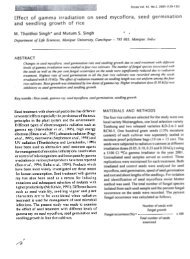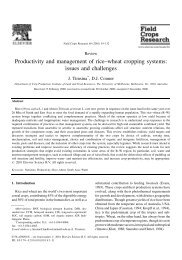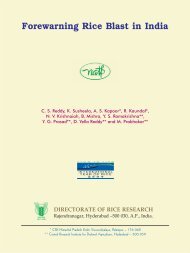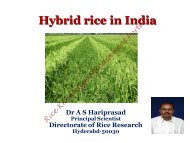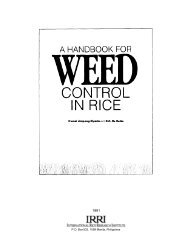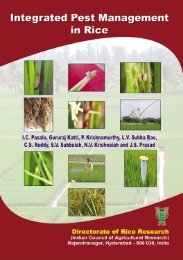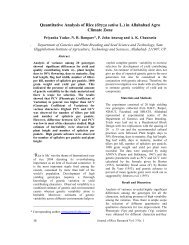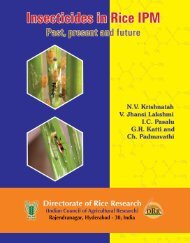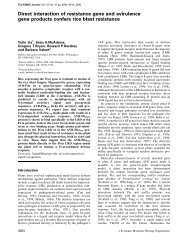Resource Book on Horticulture Nursery Management
Resource Book on Horticulture Nursery Management
Resource Book on Horticulture Nursery Management
You also want an ePaper? Increase the reach of your titles
YUMPU automatically turns print PDFs into web optimized ePapers that Google loves.
At present, more than 21,500 naturally occurring microbes or their metabolites are<br />
known to possess pesticidal properties. The sale of agrochemicals through out the world<br />
is currently estimated to be $ 26,800 milli<strong>on</strong>, whereas biopesticide sales are around $ 120<br />
milli<strong>on</strong>. Biopesticides sales, however, are estimated to increase at a rate of 10 to 25 per<br />
cent per annum in c<strong>on</strong>trast to static or shrinking world agrochemical market.<br />
Viral Biopesticides:<br />
Viral biopesticides of baculovirus group namely Nuclear Polyhedrosis Viruses<br />
(NPVs) and Granulosis Viruses (GVs) offer great scope as crop protecti<strong>on</strong> agents <strong>on</strong> high<br />
value crops such as cott<strong>on</strong> and vegetables against lepidopteran pests like Helicoverpa<br />
armigera Hbn. and Spodoptera litura Fabr. More than 500 baculovisurses (BVs) have<br />
been reported so far. Some of the insect pests from which occlusi<strong>on</strong> viruses have been<br />
reported in India have great potential in IPM.<br />
HNPV infected Catterpilar of Tomato Fruit Borer<br />
Bacterial Biopesticides:<br />
Many spore forming and n<strong>on</strong>-spore forming bacteria are known to be effective<br />
against a wide spectrum of insects and pests. The crystalliferous Bacillus thuringiensis<br />
(Bt) has been found to be effective against several species of lepidopteran pests. Its<br />
insecticidal activity is primarily caused by parasporal crystal (delta endotoxin) produced<br />
during sporulati<strong>on</strong>. The discovery of isolate capable of acting against coleopterans (B.<br />
thuringiensis tenebri<strong>on</strong>is and B. sphaericus against mosquito and B. moritai against<br />
dipteran insects has further extended the scope of bacterial insecticides. Several bacteria<br />
like, Pseudom<strong>on</strong>as fluorescens, Bacillus subtilis, Streptomyces nigrifaciens,<br />
Agrobacterium radiobacter and Azotobacter spp. are known to be potential bio-agents<br />
against several plant pathogen. Most of these bio-c<strong>on</strong>trol bacteria are, however, in the<br />
stage of empirical applicati<strong>on</strong>, either in the green house or in the field with a few<br />
excepti<strong>on</strong>s. There are reports of bacterial bio-agents in enhancing the growth and greater<br />
root volumes of crop plants when applied as seed treatment or soil applicati<strong>on</strong>. This<br />
<str<strong>on</strong>g>Resource</str<strong>on</strong>g> <str<strong>on</strong>g>Book</str<strong>on</strong>g> <strong>on</strong> <strong>Horticulture</strong> <strong>Nursery</strong> <strong>Management</strong> : 83



